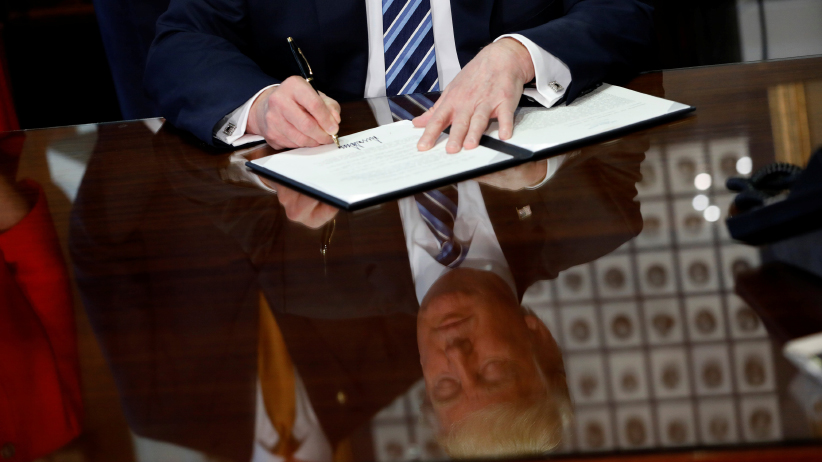The ultimate escape from Trump’s political chaos? Books.
With political storms swirling all around, a Canadian in New York City imparts his secret to inner peace: reading.
U.S. President Donald Trump signs an executive order during a ceremony with Treasury Secretary Steve Mnuchin at the Treasury Department in Washington, U.S., April 21, 2017. (Aaron P. Bernstein/Reuters)
Share

As a Canadian living under President Donald Trump, I have witnessed a good many things in his first 200 days. Some things have been heartening and brave, others bizarre and needlessly cruel. But one thing I have noticed above all is this: Different people react differently to an era of crisis.
Some people demonstrate in the streets, some sign petitions and rail on social media. Some lower their eyes, go to work, and wish for all the anxiety and rage to pass. In that way, the current moment is much like mourning: You can never really tell how you will react to chaos and loss until you are actually going through it. You might shut down, or you might lash out. And in either case, it can be surprising and impossible to predict.
My response, as someone living in a neighbouring country that has lost its way, has been this: I read.
Anything, everything. Dickens and Dostoevsky, George Orwell and Thomas Merton. While cable news chatters on about Seth Rich or Steve Bannon, I am leafing through David Copperfield or The Brothers Karamozov.
I had been like that as a child. I remember gobbling up Nietzsche’s Thus Spoke Zarathustra early on, which in retrospect was rather odd. Indeed, some of my greatest memories of childhood were of getting completely lost in door-stopping novels like Anna Karenina or Nicholas Nickleby.
But in recent years, with two boys and a career and a beagle, it has been difficult to carve out moments for something that is essentially a luxury of time. Rent and bills and appointments have a nasty way of pushing that sort of thing aside.
After Trump’s election, though, something important changed. I started devouring great books again, as if filling spaces inside myself. I ran to them as someone hot and parched dives into a pond of deep, cool water.
When I travelled back to Vancouver for the holidays, I raided my old childhood bookshelves like a bank robber emptying out a vault: For James Baldwin, Baudelaire, Neruda, Joseph Campbell. I came back to New York City with a suitcase heavy with the classics.
As this was happening, I got to wondering why I was reading as though my life were suddenly on deadline. Of all possible answers to this strange political moment, why should I choose books?
I’m no psychologist, but one guess is that reading is a kind of calculated retreat. The world may have lost its moral moorings, and politics has warped into something sinister, where elected officials conspire to hurt rather than help the people they are serving. I don’t recognize any of it.
In books, though, there is some constancy. The words of Kerouac or Krishnamurti are right there, unchanging, and anchored on the page. It’s something solid to hold onto, as the floodwaters rise around you.
It’s not just me who has turned to literature as a kind of antidote to the Age of Trump. My friend Caitlin Kelly, another Canadian writer in New York, has virtually sworn off the various forms of modern media that are arguably designed to keep us in a constant state of anxiety.
Instead, she took off to Europe for a six-week vacation—and an armful of books. “I’m reading books again for all the reasons we love books—to disappear into another world for a while,” she says. “I came home much calmer than I’ve been in months.”
In that sense, reading is about removal from the current moment. There is no denying that American politics in 2017 is a hurricane—powerful forces coming at you every day, from all sides, without ceasing. The fight can leave one broken and exhausted.
Retreating into books is like a respite for the brain: A little calm and self-care before venturing back out into the storm. Instead of speed, reading embraces slowness. It gives us perspective, restoration—maybe even some courage.
Books are also, in their own small way, acts of rebellion. In Aldous Huxley’s dystopian Brave New World, books were forbidden—even held in safes—because of the instability they represented. In Orwell’s 1984, Winston Smith’s most prized and secret possession was an old diary where he could write—and read—whatever he wanted, away from the eyes of the state.
How this political moment ends, we can’t yet say. Things are gestating that cannot be seen—including, for example, Special Counsel Robert Mueller’s ongoing investigation. Those findings may well bring down a president, after which something new and hopeful might emerge from the wreckage.
Until then, we hang on. And, crucially, we read.